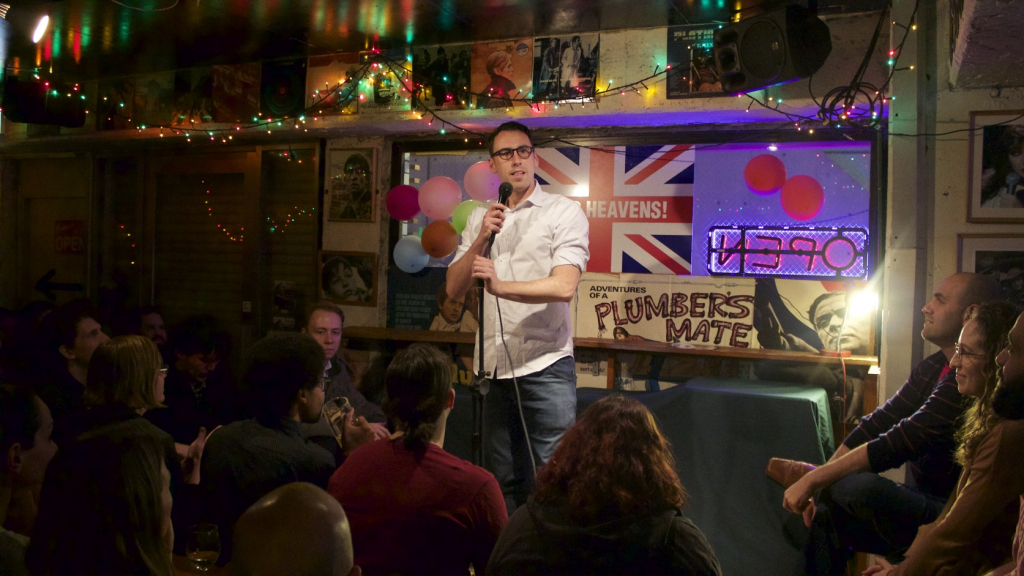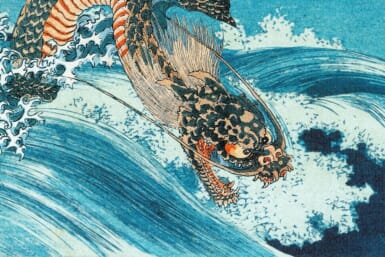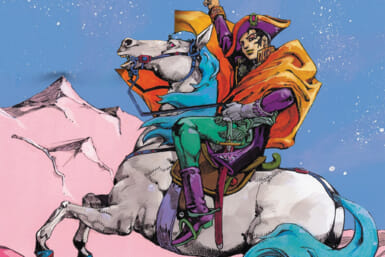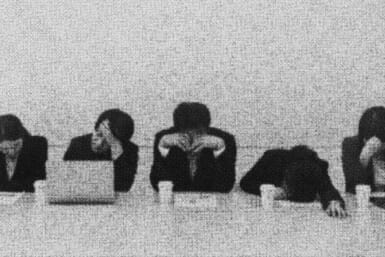Every Wednesday night the comedians of Stand-up Tokyo perform in front of a picture window adorned with a Union Jack and Christmas lights at Good Heavens British bar in Shimokitazawa. On this particular night about 30 audience members – mostly foreigners – sit at tables in front of a bookshelf lined with rows and rows of books at the small pub.
The window overlooks a trendy boutique shop and a hair salon across the street. An Alfie poster and old records hang from the wall, including a cover version of Hey Jude by Boots Randolph.
The MC for the night, BJ Fox, warms up the crowd for the upcoming performers. A table of Swedish guests dining on fish and chips are here to see the headliner, Finnish comedian and talk-show host Janne Grönroos, who came to Tokyo to perform his first show in English.
“What’s the best thing about Finland?” says Fox. “It’s really close to Sweden.”
A host of Tokyo-based stand-up comedians deliver their best jokes before Grönroos gets on stage to tell a long, laugh-out-loud story about how his mother – who happens to be in the audience – got stuck on a Japanese toilet when she couldn’t find the stop button for the bidet.
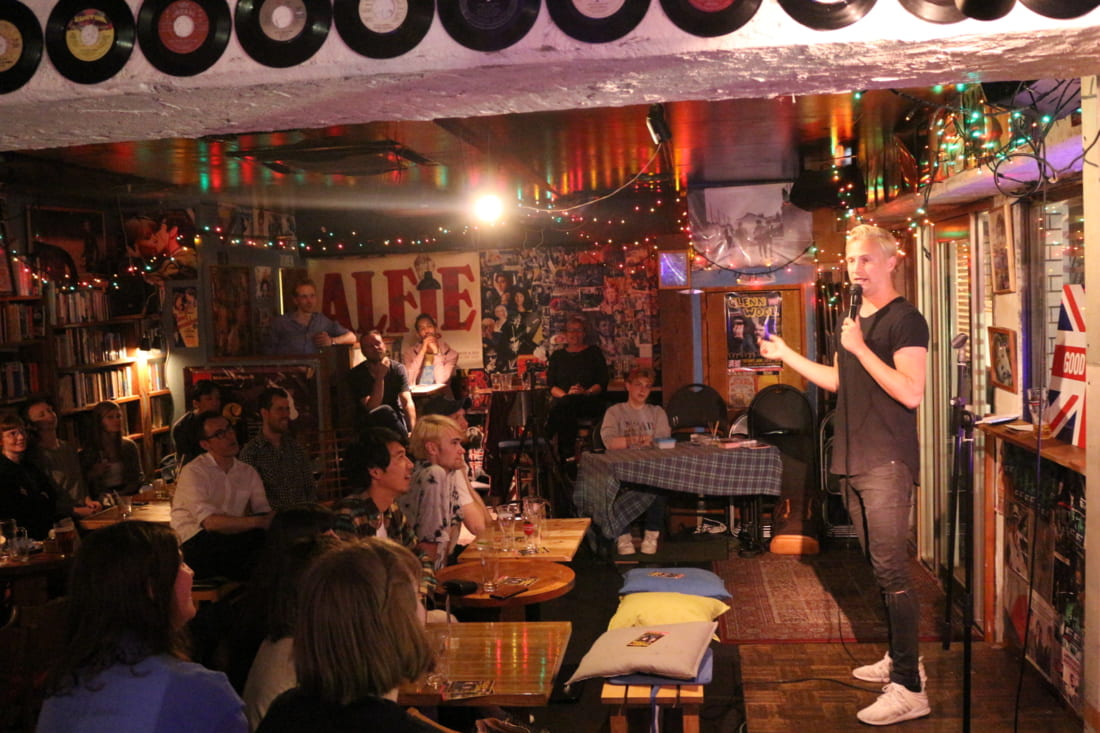
Janne Grönroos
Swedish comic Daniel Miyauchi Andersson jokes that after moving the Tsukuji fish market to Toyosu they also need to relocate Tokyo’s meat market – Roppongi. A Japanese comedian asks if there are any Japanese people here tonight. Amidst a smattering of applause, she asks, “Is this your lunch break?”
British comedian Alex Camp, who opened for Aziz Ansari during his Tokyo appearance two weeks prior, jokes about the hierarchy of English teachers in Tokyo (private international school teachers are at the top).
During a break between acts, Fox stops by the table for a chat. The native Brit arrived in Tokyo in 2015 via Singapore, where he also performed stand-up on the side. He said the comedy scene was much more vibrant there, and even the hecklers were more enthusiastic, telling him to “fuck off back to your own country.” Whereas Japanese audience members are more likely to say, “Please sir, would you speak more slowly?”
In Tokyo, Fox found a fragmented stand-up comedy scene, with individual shows being organized here and there. He launched the Stand-Up Tokyo website simply as a means to promote, and better coordinate, the various English-language shows happening across the city.
Around the same time, big-name international comedians started crossing the pond to Tokyo. In 2016 Fox returned from a ski vacation with broken ribs to discover an email asking if he could find a Tokyo venue for American comedian Hannibal Buress. Fox called up Paul Davies, owner of Good Heavens, who said OK.
“Up until recently there was this idea that you couldn’t really do a big show in Japan,” says Fox. “It just took someone brave enough to roll the dice.”
https://twitter.com/hannibalburess/status/684582817548886016
In the last year alone Jim Gaffigan, Jim Jefferies and Jimmy Carr – the three Jims – performed in Tokyo. Live Nation, which normally books musical acts like Taylor Swift, contacted Jennings to help promote similar stand-up comedians who had a sudden interest in Tokyo. Live Nation brought Dave Chappelle last March, with tickets selling out in 10 minutes.
“This is a golden age for standup. Netflix is breaking down the comedy walls between countries, and live comedy is better than it’s ever been,” says Andy Curtain, head of comedy for Live Nation Asia. “Tokyo has had a promising stand-up scene and the crowds have been super enthusiastic. And the comics have so much fun they tell their comic friends to get to Japan.”
Jim in Tokyo. #BTS pic.twitter.com/O1CBmJFDi7
— Jim Jefferies Show (@jefferiesshow) March 8, 2019
Between slinging drinks for customers, Davies, who opened Good Heavens 20 years ago, says he has seen Tokyo’s stand-up comedy scene gain traction in recent years. Good Heavens sees six to eight comedians during any given performance, with a mix of locals and professionals visiting from overseas.
“It’s much more healthier than 20 years ago,” says Davies.
The Origins of Tokyo Stand-up
Chris Wells twists his Apple Watch and the music turns down in the new theater, Studio Gokko, a snug lair located in a basement near Yoyogi-hachiman. Leather sofas for audience members line one end of the room. New black curtains hang from mobile staging rigs on the other. Nearly 25 years in the making, Wells says Studio Gokko is Tokyo’s first improv and acting studio offering classes in English, Japanese and Spanish.
A native of Peoria, Illinois, Wells competed in radio broadcasting competitions in high school. Today he is a freelance narrator whose voice can be heard making announcements at JR train stations.
He arrived in Tokyo in 1994 to study Japanese. At the time the only English-language comedy game in town was a British trio called Za Gaijin who performed a musical revue.
Within months of his arrival, Wells was recruited by Australian lawyer Nick Abrahams to perform with a new group called the Tokyo Comedy Club at their first show at Tokyo American Club. There Wells was discovered by a veteran of Tokyo’s acting scene, Michael Naishtut, who had been independently performing improv comedy.
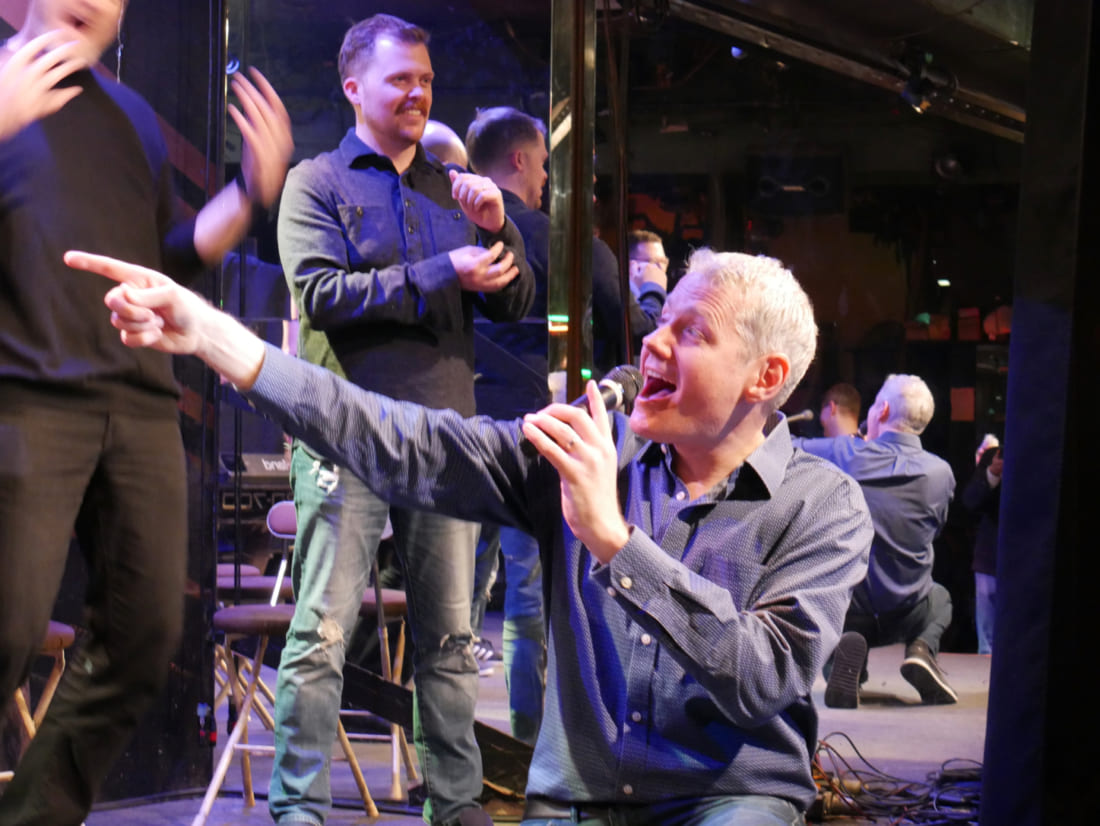
Chris Wells
In 1995 Wells was a founding member of the Tokyo Comedy Store, called “an international troupe of uninhibited clowns, stand-up comics, glib ad libbers and pratt-falling laugh-seekers” by an article in Tokyo Weekender promoting the group’s first show at the British Club.
“We were the only show in town for many, many years,” says Wells, who still organizes and performs in the monthly TCS Improvazilla comedy show at The Crocodile in Shibuya. “We started from scratch. When you start from scratch you’ve got to build the culture. You’ve got to build the knowledge. You’ve got to build the support systems. The mentoring, all of that takes place.”
He says a comedy show called the Tokyo Cynics organized by a hypnotist started at The Fiddler in Takadanobaba. A group connected to Hong Kong brought well-known British comedians to Pizza Express, a pizza parlor once located in Omotesando where Tokyu Plaza now stands. A second improv group – Pirates of Tokyo Bay – emigrated from Osaka in 2010 and has been going strong ever since.
https://www.instagram.com/p/B3YhQdqHV6p/
Wells says he now performs alongside actors who have 10 to 15 years of experience at TCS Improvazilla. They perform at festivals all over the world. Wells studied with a well-respected improv group in Los Angeles this summer, and this month he is teaching at a festival in Vancouver.
“The quality has gotten better,” he says. “At first, 25 years ago, people are just amazed that anything in English is happening in Tokyo. As more and more people started doing it, and as the people that were doing it refined their taste and learned more, we’ve elevated our game.”
A Vibrant Scene
When Sam O’Toole, one half of John and Sam in Japan: The International Comedy Podcast, moved to Japan 14 years ago, Tokyo Comedy Store was the only English-language comedy act he could find.
“I went to watch as an audience member and I really enjoyed it. I went back and enjoyed it again,” says O’Toole. “I was into comedy anyway, and then, I was sitting there thinking, ‘God I’d like to do that.’ There was a little bit of me thinking, ‘I could be that funny.’”
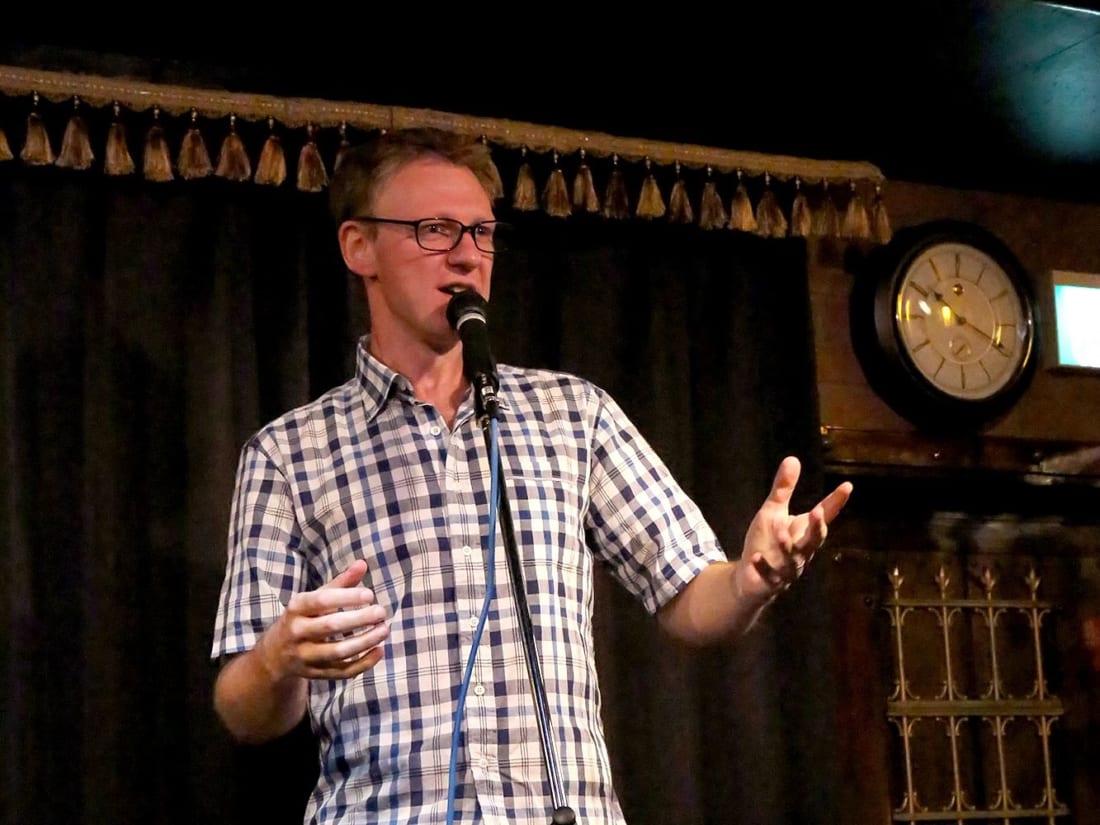
Sam O’Toole
Ten years ago O’Toole started telling jokes at Tokyo Comedy Store’s open mic night and then joined a new group called the Mad Cows of Tokyo. He said the crew was difficult to maintain as members moved back home, started families, etc. Members of the Mad Cows eventually reemerged as Stand-Up Tokyo.
“Slowly but surely the five original guys running Stand-Up Tokyo dropped off and then [BJ Fox] came in and basically, we sort of passed it off to him. It didn’t happen in one big go. It sort of phased in and out,” says O’Toole. “[Fox] came in and really pushed it hard. Because of that, there are lots more independent shows, sort of under the umbrella of Stand-Up Tokyo.”
The Stand-Up Tokyo open mic night is held every Monday at Titans Craft Beer Taproom. There are workshops for beginners, the Sumo Slam and Tokyo Roast Battle. Fox’s endeavor called Okomedyaki allows comedians the opportunity to perform stand-up in Japanese.
New Season, new stories, and a workshop – Perfect Liars Club is BACK!! – https://t.co/j61LsWdJva #storytelling #tokyo #comedy #gameshow pic.twitter.com/W5t3mqOgAE
— Perfect Liars Tokyo (@perfectliarsTKY) September 10, 2019
O’Toole, who organizes a stand-up show in Kanagawa, says there are other shows outside of Tokyo in Yokohama, Yokosuka and elsewhere. A Tokyo chapter of Perfect Liars Club hosts regular shows at Good Heavens.
“In terms of the local scene, it’s expanded so much now that I think there is more room for growth but I wonder how much,” says O’Toole. “There are shows practically every day. Because you are in Tokyo there are a finite number of foreigners who want to come see comedy. You have tourists coming through but you can’t rely on them. You really want to be getting people who become regular audience members. That is kind of the dream. But people are working. They leave the country. It really is a push to get these people to come back again and again.”
Bringing Their A-Game
Wells says the only comedians earning a profit performing in Tokyo are the international stand-ups charging ¥5,000 per ticket. After Buress performed in 2016, general consensus is that the first A-list comedian to appear in Tokyo was Eddie Izzard, who Tokyo Comedy Store hosted in early 2017. Jimmy Carr performed in Yamano Hall in Yoyogi a month later.
“It’s not a place on British or American comedians’ radar, but I think it should be,” Carr told Tokyo Weekender at the time.
https://www.instagram.com/p/Byab-lMByyP/
Since then the number of international comedians coming to Tokyo has snowballed. Fox says demand has increased as the Tokyo expat community recovers following the 2007 Lehman shock and 2011 Tohoku earthquake and tsunami. He also says Japan overseas promotion ahead of the 2020 Olympics has had an effect.
“It doesn’t surprise me that Dave Chappelle, Jim Gaffigan are coming in the same week and it’s cherry blossom season,” says Fox.
O’Toole notes many of the international comedians are performing in Tokyo on weekdays, ahead of their premium weekend shows in Australia or China.
Scottish comedian Daniel Sloss, who performs in Tokyo this upcoming Tuesday as part of his Daniel Sloss: X tour (before appearing in Hong Kong on Friday and a week-long stint in Australia), says in terms of having a reputation as a destination for stand-up comics, Tokyo “doesn’t have one.”
“I have never met a stand-up comedian who has gigged in Tokyo. Or if I have, they didn’t mention it,” says Sloss. “I want to see what the city is like. I want to try the food and I want to drink with the locals. I’ve never been to Japan and I’ve always wanted to visit Tokyo, as my mother loves it there.”
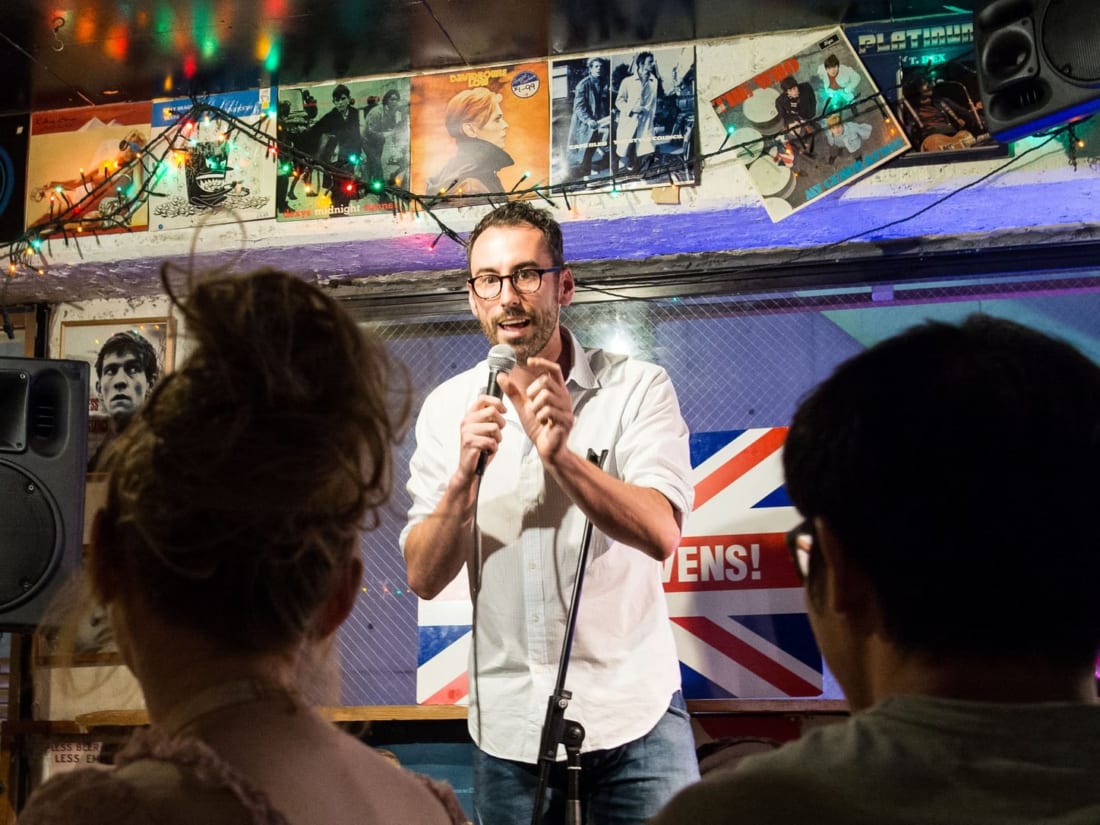
BJ Fox
Quality Counts
Fox says the name-brand comedians will continue to come to Tokyo and shine a spotlight on the local comedy scene. While performing at Good Heavens a couple of years ago, Fox was spotted by a producer for NHK World, who invited him to write a sitcom. Season two of Home Sweet Tokyo, in which Jennings also stars, is re-airing now.
“You go to a show in Roppongi or Shimokitazawa and it’s the same quality as you would see in London,” says Fox. “I feel like being on a sports team, when you have a younger player coming through, the older players have to up their game…. It’s like a virtuous cycle of new blood, new audiences energizing the scene.”
Back on the stage at Good Heavens, trying to connect with an audience of Scandinavians, Fox follows one of the rules from The Comedy Bible by Judy Carter – make fun of your own foibles to help bond with the audience.
“You can be whatever you want in Japan. Bring a guy from the UK over here and he can be a stand-up comedian,” says Fox. “Or just call me John Greenrose, a character that died in season one of Game of Thrones.”
https://www.instagram.com/p/B1hZlv8HlVM/?hl=en

